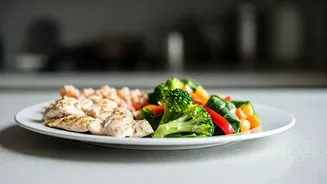Zinc's Protective Role
Zinc is a fundamental mineral in the body, and it significantly impacts hair health. It is essential for tissue growth and repair, including the follicles
that produce hair. Zinc plays a vital role in protein synthesis and cell division, both of which are crucial for hair development. When zinc levels are deficient, hair growth can slow down, potentially leading to thinning. Supplementing with zinc can help boost hair growth, although it's crucial to maintain a balanced intake. Zinc is also linked to maintaining the oil glands around the hair follicles, thus keeping the scalp moisturized and reducing hair breakage. Zinc's involvement with other nutrients, like vitamin A, further underscores its importance in overall hair health. It's always best to consult a healthcare professional before incorporating zinc supplements into your routine.
Iron's Oxygen Transport
Iron plays an indispensable role in hair health due to its ability to transport oxygen to the hair follicles. Without enough iron, hair follicles can be deprived of the oxygen they need to function properly, which may result in hair thinning. Iron deficiency, often linked to anemia, is a prevalent cause of hair loss. The body's ability to produce hemoglobin, which carries oxygen, is directly dependent on iron. When hemoglobin levels are insufficient, oxygen supply to hair follicles is diminished. This lack of oxygen impacts the follicles' ability to grow healthy hair, leading to hair shedding. A diet rich in iron or, if necessary, iron supplements prescribed by a doctor, may help improve iron levels and potentially reduce hair thinning. Be mindful of the potential side effects of excess iron, and always consult your doctor before beginning supplementation.
Biotin for Keratin
Biotin, also known as vitamin B7, is often hailed as a key nutrient for hair health. This water-soluble vitamin is a part of the B-complex group and is essential for the body's metabolic functions, including the production of keratin. Keratin is a key structural protein that constitutes hair, skin, and nails. Biotin assists in keratin synthesis, making hair stronger and more resilient. Insufficient biotin levels can lead to brittle hair and hair loss. While biotin deficiency is rare, adequate intake through diet or supplements is generally beneficial for hair health. Biotin can enhance hair strength, improve elasticity, and possibly boost hair growth. Natural sources of biotin include eggs, nuts, seeds, and certain vegetables. Including these in your daily diet might help keep your hair looking and feeling its best. Consult with a doctor regarding appropriate dosages of biotin supplements.
Vitamin D's Impact
Vitamin D plays a crucial role in numerous bodily functions, including the health of hair follicles. Receptors for vitamin D are found in hair follicles, which indicates that vitamin D is involved in the hair growth cycle. Adequate levels of vitamin D can help stimulate new and existing hair follicles, promoting hair growth. A lack of vitamin D has been associated with hair loss, specifically alopecia areata, an autoimmune condition that causes hair loss. The body synthesizes vitamin D through sun exposure, and it can also be obtained through diet or supplements. Maintaining optimal vitamin D levels may reduce hair thinning and support overall hair health. It's advisable to get vitamin D levels checked by a healthcare provider to determine if you need to add supplements to your diet. Also, incorporate foods that are naturally rich in vitamin D, such as fatty fish and fortified foods.
Omega-3 Fatty Acids
Omega-3 fatty acids are beneficial for overall health, including the well-being of hair follicles. These essential fats possess anti-inflammatory properties that may reduce inflammation in the scalp, which can impede hair growth. Omega-3s help nourish the scalp and promote healthier hair. These fats are found in foods like salmon, flaxseeds, and walnuts, supporting both hair and scalp health. They can make hair shinier and stronger by adding essential moisture. The anti-inflammatory effects of omega-3s can also reduce hair loss. Ensuring sufficient omega-3 intake may improve hair density and thickness, contributing to overall hair health. Dietary modifications, like incorporating more fatty fish or consuming omega-3-rich seeds, can be beneficial. Omega-3 supplements are available, but it's wise to consult with a medical professional before starting to take them.
Protein's Building Blocks
Hair is predominantly made up of a protein called keratin, so sufficient protein intake is vital for hair health. Protein provides the amino acids needed to build and maintain hair strands. When the body doesn't receive enough protein, it may prioritize essential functions over hair growth, which can lead to hair thinning. Protein deficiency can cause hair to become weak, brittle, and prone to breakage. Eating protein-rich foods like lean meats, poultry, fish, eggs, and legumes may help ensure adequate protein intake. High-quality protein supports strong, healthy hair by providing essential amino acids for hair growth and repair. Vegetarians and vegans should pay attention to the right mix of protein sources to ensure that they receive all essential amino acids. Proper protein consumption supports hair's structural integrity, helping it stay strong and resist damage.
















